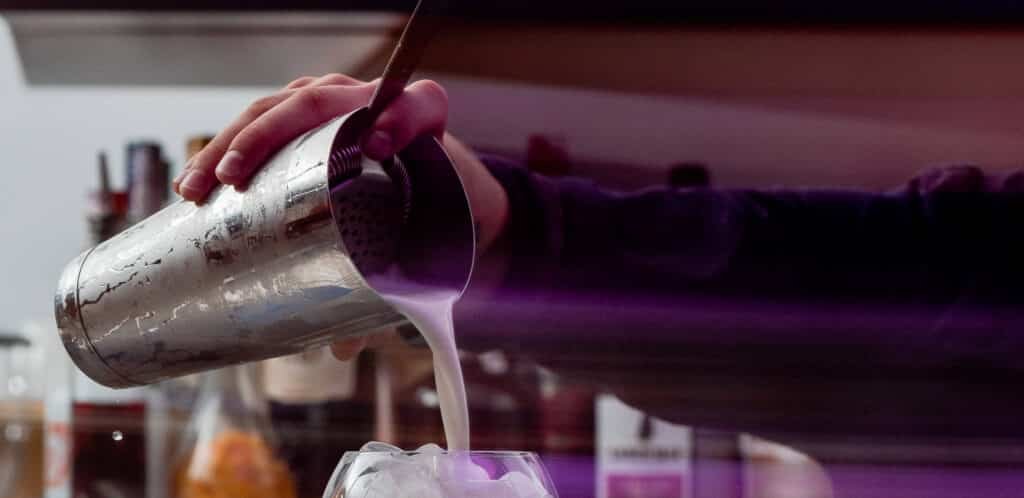
Bartender knowledge is very important as it is the main way for anyone in this profession to achieve the best results possible. There are some things that are only learned with experience. Sometimes we hear them from others, but they only sink in when we go through them.
As you gain experience and knowledge in mixology, you can begin to experiment with more complex and unique cocktails. You can learn about different techniques, such as infusions and barrel aging, and explore the use of unusual ingredients like herbs, spices, and bitters.
By developing your mixology skills, you can create drinks that are not only delicious, but also visually stunning and memorable.
-
The Importance of Presentation
There are many factors to consider when it comes to presentation. One of the most important is garnishes. A well-placed garnish can take a drink from good to great. It can add a pop of color or a hint of flavor that can really make the drink stand out. There are so many options when it comes to garnishes. From citrus peels and herbs to edible flowers and even candy.
Another important aspect of presentation is glassware. Different drinks require different types of glasses, and using the right one can really enhance the presentation. A margarita looks much better in a classic margarita glass than it does in a plain old rocks glass. A martini just isn’t the same if it’s not served in a sleek, stemmed glass.
But it’s not just about the garnishes and the glassware. It’s also about the way you serve the drink. A well-crafted cocktail should be served with finesse. Maybe you shake it with vigor and strain it with precision. Maybe you pour it over a beautiful ice sphere. Whatever the technique, it should be done with care and attention to detail.
When all these elements come together for a blend. This means the garnishes, the glassware, the technique. The great thing is that the result is amazing. You get a drink that not only tastes great, but looks great too. That can make all the difference in the world.
Customers are more likely to enjoy a drink that is visually appealing. They are more likely to remember it too. So, if you’re serious about bartending, take the time to master the art of presentation. It’s an investment that will pay off in spades.
-
Product Knowledge is Bartender knowledge
First and foremost, you need to have a deep knowledge of different types of alcohol. This includes not only the most popular spirits. For example, the vodka, gin, and whiskey, but also more obscure liquors like amaro, mezcal, and cachaça. Understanding the nuances of each spirit. Such as their flavor profiles, production methods, and geographic origins. This allows you to create unique and complex drinks that showcase the best of each ingredient.
But it’s not just about the alcohol found in the mixes. You also need to be well-versed in mixers, bitters, and other ingredients. From simple syrups and juices to more complex infusions and tinctures. Every ingredient you use can have a profound impact on the flavor of the final product. By understanding how each ingredient works and how it interacts with other components. You can create drinks that are perfectly balanced and tailored to each customer’s preferences.
In addition to knowing the ins and outs of individual ingredients. It’s also important to have a broader understanding. Mainly of the history and origins of different drinks. Whether it’s a classic cocktail like a Manhattan or a more contemporary creation. Understanding the story behind the drink can help you to better appreciate its flavors. You will also make more informed recommendations to your customers.
Ultimately, developing your product knowledge is key to being a successful bartender. By having a deep understanding of the ingredients you work with. You can create drinks that are not only delicious, but also perfectly suited to your customers’ tastes. Also in a highly competitive industry like bartending, that can make all the difference in the world.
-
Staying Organized is part of Bartender knowledge
It’s important to know where all of your ingredients and tools are located. Whether you’re working behind a bar with a wide array of spirits and mixers. Or in a more streamlined setting with limited supplies, having a designated spot for everything can help you work efficiently. This means knowing where to find everything from your jiggers and shakers to your garnishes and glassware.
But knowing where things are located is just the beginning. You also need to be able to access everything quickly and easily. This means keeping your work area clean and organized, with everything within arm’s reach. By doing so, you can minimize the time you spend searching for ingredients or tools. Also maximize the time you spend actually making drinks.
On top of keeping your work area clean and tidy, it’s also important to stay on top of tasks like restocking and cleaning glasses. This means making sure that you always have an ample supply of ice, mixers, and garnishes on hand. Also regularly washing and drying your glassware. By staying ahead of these tasks, you can ensure that you’re always prepared to make drinks quickly and efficiently.
Staying organized is key to being a successful bartender. By knowing where everything is located, keeping your work area clean and tidy. Also staying on top of tasks like restocking and cleaning glasses, you can work efficiently and provide excellent service to your customers. And in a fast-paced industry like bartending, that can make all the difference in the world.
-
Communication Skills are part of the process of Bartender knowledge
As a bartender, one of the most important skills you can possess is effective communication. Not only is it essential for providing exceptional customer service. It can also help you work more efficiently and effectively with your colleagues.
When it comes to communicating with customers, being able to speak clearly and confidently is key. You need to be able to explain drink options, answer questions about ingredients or preparation methods. Also make recommendations based on a customer’s preferences. Additionally, actively listening to their needs and preferences can help you tailor your service to their specific desires, which can lead to greater customer satisfaction and loyalty.
With that said, communication isn’t just important when it comes to customers. As a bartender, you’ll also need to work closely with other staff members, such as servers and kitchen staff, in order to ensure that orders are processed quickly and accurately.
This means being able to communicate effectively with your colleagues, whether it’s through verbal instructions, hand signals, or written notes. You’ll need to be able to coordinate and prioritize tasks, and delegate responsibilities. You should also stay on top of any changes or updates to orders or inventory.
In short, effective communication is a crucial component of being a successful bartender. By honing your communication skills, you can not only provide excellent service to your customers but also work more seamlessly with your colleagues, creating a positive and productive work environment.
-
Handling Difficult Customers
As a bartender, dealing with difficult customers is a reality of the job. Whether it’s a customer who has had a bit too much to drink or someone who is just having a bad day, knowing how to handle these situations with grace and professionalism is essential to providing exceptional service. This is the kind of Bartender knowledge everyone needs to have.
When it comes to dealing with drunk or disorderly customers, the first priority should always be safety. If a customer is exhibiting behavior that is dangerous or threatening. It’s important to get the situation under control quickly and involve management or security if necessary. However, if a customer is simply being loud or disruptive. There are a few tactics that bartenders can use to help calm the situation.
One effective strategy is to listen actively to the customer’s concerns and empathize with their situation. By acknowledging their frustrations and showing that you understand where they’re coming from, you can help to de-escalate the situation and prevent it from becoming more heated. Additionally, offering solutions or compromises, such as offering a different drink or suggesting a change of scenery, can help to shift the customer’s focus and diffuse the tension.
Another important aspect of handling difficult customers is maintaining a professional demeanor at all times. It can be easy to get frustrated or defensive in the face of a challenging customer, but remaining calm and respectful is essential to maintaining a positive reputation and building a loyal customer base.
By keeping a level head and treating every customer with kindness and respect, even in difficult situations. You can help to establish yourself as a reliable and trustworthy bartender who customers can count on.
-
Continuing Education
As with any profession, it’s important for bartenders to continually learn and grow in their field. With new drinks, techniques, and trends constantly emerging. It’s essential to stay up-to-date in order to provide exceptional customer service.
One of the best ways to continue your education as a bartender is to attend seminars or workshops. These events can offer valuable insights and information from industry experts, as well as opportunities to network. Mainly with other professionals in the field. Whether it’s a class on mixology techniques, a seminar on hospitality and customer service, or a workshop on bar management, there are countless opportunities to expand your knowledge and skills.
Additionally, staying up-to-date with industry publications and trends can help bartenders stay at the forefront of the field. Subscribing to industry magazines or newsletters, following influential bartenders on social media. Also attending industry conferences or competitions can all help you stay informed about new trends, products, and techniques.
This knowledge can not only help you better serve your customers. It can also set you apart as a knowledgeable and innovative bartender in the eyes of potential employers. This is crucial for freelancing bartenders.
-
Networking for bartender knowledge
Building a strong network of professional contacts can be crucial to advancing your career. Also for staying informed about the latest trends and techniques in the industry. Whether it’s connecting with other bartenders, industry leaders, or suppliers, networking can offer numerous benefits to help you succeed.
One way to build your network is to attend industry conferences and competitions. These events provide opportunities to meet other bartenders and industry professionals from around the world, learn about new products and techniques, and showcase your own skills and knowledge. They can also be a great way to stay informed about new trends and developments in the industry, and to get inspiration for new drink creations and menu items.
Another important aspect of networking is building relationships with other bartenders and industry professionals. This can involve simply striking up conversations with fellow bartenders at work or attending events where you can meet and connect with others in the industry. By building strong relationships with others in the field, you can gain valuable insights and advice, collaborate on projects, and even find new job opportunities.
Party Shakers offers the best bartending services for your next event
If you are looking to hire a reliable service for your next event, you will find that Party Shakers offers everything you need. We have the best beverage catering services, but we also offer some of the most reliable extra services for events such as photo booths and music DJs.
Be sure to contact us and let us know what you need done. We have a team of highly professional bartenders that can make your events unforgettable.
Questions and answers
What is the number one thing that bartenders should know?
There is no specific thing because there are many, but at the end of the day, it is important to know mixology and customer service. These two are essential and if they are combined with emotional control, this makes a bartender really good.
Is freelancer bartending the best option?
There are many bartenders who prefer the steady paycheck, but the truth is that it can be hard to achieve results this way. You are limited to that paycheck while freelancing allows for more possibilities.
Are there schools to learn bartending?
Yes, there are bartending schools, but it is often more common to see bartenders learning on their own. This is because the process of bartending is one that is more likely to be learned effectively in the field.
Final thoughts on bartender knowledge
Bartending is a challenging and rewarding career that requires a wide range of skills and knowledge. By focusing on areas like time management, mixology, presentation, and communication, you can become a skilled and successful bartender who provides excellent service to your customers.
By continuing to learn and grow, and building a strong network of industry professionals, you can enjoy a long and fulfilling career in the exciting world of bartending. This is the main reason why so many people are pursuing this career now. They see the potential it has and it can be quite a fun way to make a living once you get the hang of it.
You can also hire Party Shakers to see how bartenders with experience handle their events!




